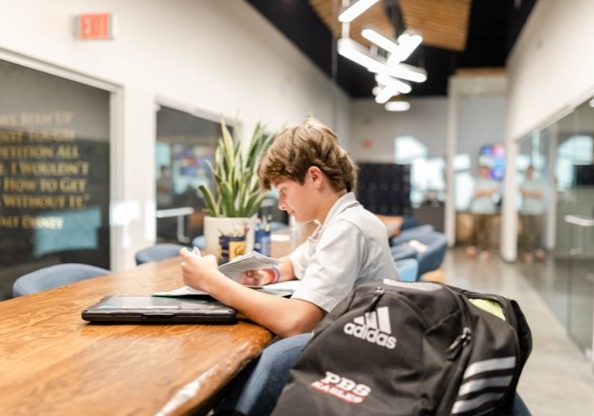
As a teenager, you have a job. That job is to prepare yourself to become a functioning human in our society who will one day move out of your parents’ house, get a job, and give back to your community. We hope you find wonderful happiness, that all your dreams come true, and that you change the world for the better. But mostly, you will need a job because that is how you will be able to buy things like food and clothes and your own cell phone plan.
In middle school, you learn how to study and take tests for high school. Middle school is also where you stop being little and cute and therefore teachers stop giving you A’s just because you showed up to class and played nicely with your friends. Middle school is rough, and learning how to study now can be a kick in the pants, but if you learn the right methods and create good study habits you’ll be all set in high school.
High school is where you learn how to study to prepare for college. In high school, it gets real and your grades really do matter. These four years will help you decide your major, which will help you decide your career, which will decide the rest of your life but, hey, no pressure whatsoever. Honing your study habits in high school will make your junior and senior year so much easier, and you will need all the help you can get in those years.
Once you’re in college, you are on your own. Sure, stay up until 4am in college and no one cares. Some college courses only have one grade—the final exam—so just ace that and you’re good, right? Good luck if you haven’t studied before then. If you don’t have good study habits now, they won’t just automatically appear once you’re in college. Do the work now while the stakes are lower.
Developing study habits that work for you now will pay off dividends later when your academic career really matters…like when you’re trying to get someone to pay you for your work and all. Below are some helpful tips that can help you create lifelong disciplined study habits.
Routine
Studying at the same time every day creates a habit that will be hard to break. Are you an early riser? Study for 30 minutes before school every day, even if it is just reviewing your notes. (By the way, take notes). Are you a night owl? Study after all your extra-curricular activities each evening. Read through all your class notes before you go to bed, even if you think you know everything (you don’t), just review.
- Set an alarm to remind you it’s time to study. Alexa and Siri are great for this.
- Create a schedule in your calendar for studying. Choose different time segments for different subjects.
- Note deadlines for projects and tests in your calendar, and start planning your work and study time backwards from that. Do. Not. Cram.
- Make your study schedule and stick to it!
Space
Designate a space that is quiet and stocked with all the materials you need (pencils, paper, iPad, laptop, protractor, compass, etc). This could be in your room, but only if you have a desk in your room. Don’t study in bed. You will get tired and waste time thinking about how you’d rather be sleeping. When you’re studying, you are working, and no one works in bed. Get thee to a desk wherever that may be.
A dining room is also a good space, it just depends on your household and how many little siblings you have running around or watching Sponge Bob at full volume in the next room.
Your space should be:
- Quiet (from outside noise, if music helps you study, that’s fine. It just needs to be your music, not your little sister’s coming from the next room).
- Appropriately equipped with a desk and any study materials you need
- Distraction-free
- Organized (Seriously, pick your dirty clothes up off the floor and make your bed. As the U.S. Navy says, “If you want to change the world, start off by making your bed.”)
Take breaks
Study in increments and take breaks. Go to the kitchen for ice cream, go for a run, or get on social media with your friends during these breaks. Take a shower because it’s possible you smell bad. Do something other than homework and studying. Set a timer for your break for 15-20 minutes, and then get back to work.
Plan Ahead
Do not cram. You know when that big science test will be, your teacher tells you a good couple weeks in advance. Sometimes, it’s noted on the syllabus at the beginning of the year. DO. NOT. CRAM. Study in spurts early on, and then get some serious studying in the week of and a few nights before the big exam.
Don’t cram.
Sleep
You need sleep. If any of your friends are bragging about how little sleep they get because they’re studying all the time, they’re either fabricating the truth, they’re trying to make you feel inferior, or they’re crazy. You need sleep! Your parents sleep. Doctors sleep. The President of the United States sleeps. Jeff Bezos sleeps. Our brains process all of what we’ve learned that day, but much more so when we sleep. Study and do your homework, then drink your Sleepy-Time tea and sleep. If you have a huge project or test you’re working on that requires more waking hours of work, set your alarm and have a parent wake you up to do more work in the morning.
But, seriously, sleep. Schedule it in your calendar if you have to.
Study in Groups
Misery loves company, and chances are someone in your class was paying attention while you were daydreaming. Plus, sometimes our peers have a way of explaining things to us that we didn’t understand when the teacher explained it. And you can gain understanding by explaining the concepts to someone else. If you can’t teach it, you don’t really know it. Group study is a great way to bounce information off each other so you all remember it.
Review Notes after Class
You must take notes. You may think you don’t need to write things down because you’re not old, but you really do need to take notes. There is no other way to ensure you know everything your teacher wants you to know.
Write down important points, dates, formulas, and vocabulary. If the teacher writes something on the smartboard, write that down. If she writes it down, it’s important and you need to write it down too.
Review your notes in the morning when you are brushing your teeth, in the carpool to and from school, and at night before you go to bed.
You’ve got a plan now…congratulations, that was the hard part! Next, all you have to do is execute it, and before you know it, your study time will be efficient and effective. With your newfound excellent study habits, you can now spend more time on other important things, like practicing to be a ninja warrior or whatever it is you’re in to these days.




